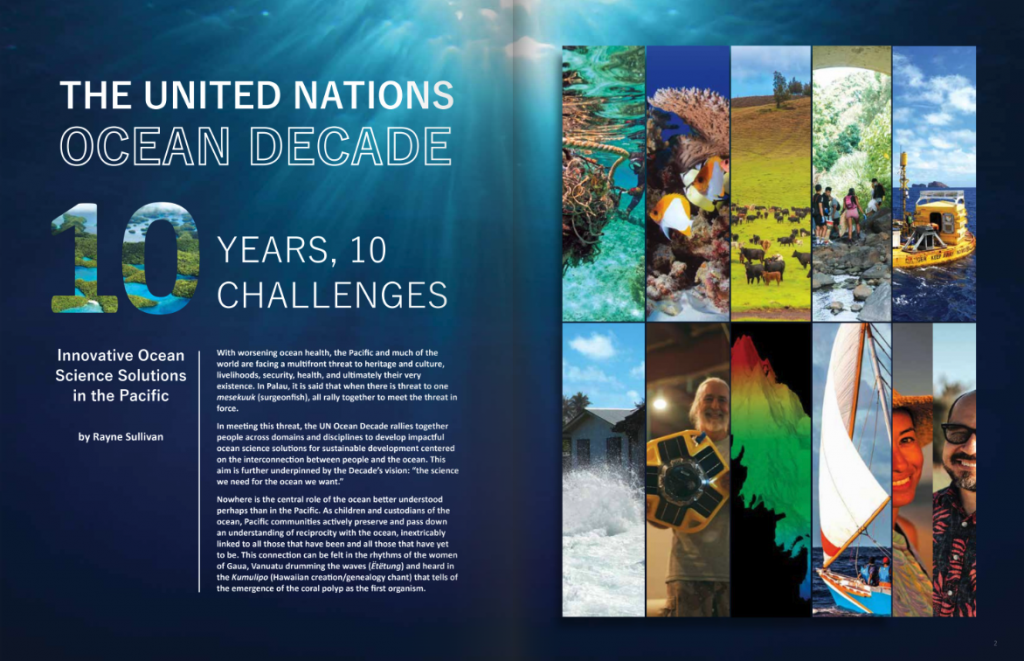With worsening ocean health, the Pacific and much of the world are facing a multifront threat to heritage and culture, livelihoods, security, health, and ultimately their very existence. In Palau, it is said that when there is threat to one mesekuuk (surgeonfish), all rally together to meet the threat in force.
In meeting this threat, the UN Ocean Decade rallies together people across domains and disciplines to develop impactful ocean science solutions for sustainable development centered on the interconnection between people and the ocean. This aim is further underpinned by the Decade’s vision: “the science we need for the ocean we want.”
Nowhere is the central role of the ocean better understood perhaps than in the Pacific. As children and custodians of the ocean, Pacific communities actively preserve and pass down an understanding of reciprocity with the ocean, inextricably linked to all those that have been and all those that have yet to be. This connection can be felt in the rhythms of the women of Gaua, Vanuatu drumming the waves (Ëtëtung) and heard in the Kumulipo (Hawaiian creation/genealogy chant) that tells of the emergence of the coral polyp as the first organism.
Acknowledging this interconnection between people and the ocean, the Ocean Decade outlines ten ambitious challenges to secure seven key transformative outcomes. These challenges encompass everything from a resilient ocean protecting both ecosystems and communities, to an accessible ocean where data and innovation are equitable both in their access and benefits.
The Ocean Decade is distinct from, but complemented by, the wide constellation of existing ocean governance and policies. Diverging from the recent Biodiversity Beyond National Jurisdiction treaty (BBNJ) or the 2050 Blue Pacific Strategy, the Decade focuses on capacity building for science and knowledge to advance the 2030 Agenda for Sustainable Development (the 17 SDGs). In advancing the 2030 Agenda, especially SDG 14 “Life Below Water,” the Ocean Decade Alliance sets out to move beyond the conventional ocean science approach of identifying and assessing problems. Instead, the Decade will work on generating solutions through collaborative, science-backed networks of partners to align and mobilize financing, communications, influence, and research.
The Ocean Decade has been further galvanized by the swelling international attention and prioritization of the ocean-climate nexus. Within the UN process, ocean concerns were formally included in the Paris Agreement’s Preamble in 2015. These concerns later took center stage in 2019 at COP25 led by Chile. Known as the “Blue COP,” that meeting launched an Ocean-Climate Dialogue for ocean-based action, which was subsequently mandated as an annual dialogue by COP26’s Glasgow Climate Pact. At the recent COP27 in Egypt, this momentum culminated in several significant commitments. The U.S. and Norway launched the Green Shipping Challenge to advance zero-emission shipping. Emphasizing the importance of biodiversity and ecosystem services, private and public sector leaders launched the Mangrove Breakthrough, a project that strives to secure a $4 billion USD investment to restore mangroves around the world and protect 15 million hectares of mangroves by 2030. At COP27, Pacific nations worked tirelessly with other island nations to achieve historic progress including pushing for the inclusion of stronger provisions in the Sharm el-Sheikh Implementation Plan that encourage countries to include ocean-based action plans in national climate goals.
Amidst this sea of challenges, Hawaiʻi and the Pacific remain a reservoir of inspiration, solutions, and resilience. In the Western Pacific, Palau’s National Marine Sanctuary (PNMS) is a model for innovative global conservation prioritizing local communities. The PNMS harnesses traditional practices such as the bul (moratorium placed on natural resources) and leverages international collaboration to align biophysical and social science for monitoring one of the world’s largest marine protected areas.
Working with partners to protect nature-based solutions through novel financial instruments, Hawaiʻi has become the first pilot site in the U.S. to implement an insurance policy to safeguard coral reefs and their restoration.
Bridging Indigenous knowledge and equitable ocean conservation, the Office of Hawaiian Affairs’ new ocean policy campaign aims to reaffirm the pilina (relationship/connection) between kānaka (Hawaiians) and ʻāina/kai (land/ocean) through intergenerational management of marine resources informed by Native Hawaiian knowledge and practice.
The ocean is our greatest shared gift, benefiting everyone but rightfully belonging to no one. Whether it’s feeding 3 billion people, supporting industries that contribute $2.5 trillion USD each year to the global economy, or producing half of the oxygen we breathe, the ocean plays a central, multifaceted role in social, economic, and ecological health. Every community is an ocean community, and these solutions showcase how Hawaiʻi and the Pacific have and will continue to play an indispensable role in achieving the Ocean Decade goals.
Browse Ka Pili Kai issues HERE


